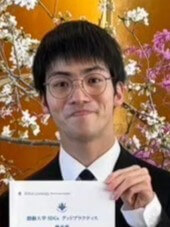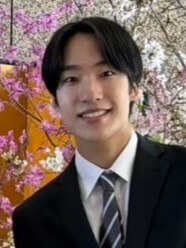Student group puts into practice a project to promote clothing sustainability by making T-shirts

Hideaki Sakabe
4th year student Faculty of Business Administration Department of Business Administration
Takahiro Nakagawa
4th year student Faculty of Business Administration Department of Business Administration
The Nomura Seminar Faculty of Business Administration is working on a practical project for the SDGs in collaboration with industry to learn how to evaluate companies from an environmental perspective. As part of one of their activities, the "Fuku no Kimochi" project, last year, students in the seminar worked to change the T-shirts made by student groups on campus into environmentally friendly ones. We spoke to Hideaki Sakabe and Takahiro Nakagawa, who played key roles in this project, which won the Excellence Award at the university's second SDGs Good Practices Awards, about the characteristics of the project and the thoughts behind it.
What is the "Feelings of Clothing" project that Nomura's seminar is currently working on?
Sakabe: This project was started with the aim of focusing on and solving the environmental impacts such as the CO2 emitted when incinerating unwanted clothing and stock fabric, and the marine pollution that accompanies disposal.
Nakagawa: When the project started in 2021, we made T-shirts from fabric that was scheduled to be discarded and sold them on campus. From the second year onwards, we started to collect discarded clothing on campus, recycle it into thread and use it to make new T-shirts.


This project, which is a spin-off of "Fuku no Kimochi," is called "Turning the T-shirts made by student groups into environmentally friendly T-shirts!" What is it?
Nakagawa: This project recruits organizations that want to make environmentally friendly T-shirts using recycled materials, and subsidizes part of the cost of making the T-shirts on the condition that they measure their CO2 emissions. Unlike previous "Fuku no Kimochi" projects that focused on discarded clothing, this is a new initiative that reconsiders the environmental impact of newly purchased clothing.
Sakabe: We came up with this idea after noticing that student groups on campus were making original T-shirts for events such as the Soka University Festival. We thought that by changing those T-shirts into environmentally friendly ones that can be worn for a long time and are recyclable, we could contribute to Soka University becoming carbon neutral.
Nakagawa: I was worried about how to make students aware of eco-friendly choices. T-shirts made from recycled materials cost two to three times more to produce than T-shirts made from regular materials. By utilizing the SDGs Good Practices grant, we aimed to keep the cost affordable for students and create an opportunity for more students to take action on environmental issues.
What's unique is that measurement of CO2 emissions is a condition for payment.
Sakabe: First, we, the seminar students, received a lecture from an expert, and based on that, we explained the measurement methods to the student group and had them report the results of their measurements. Our seminar has the motto "Learn, act, implement." Rather than simply adopting an environmentally friendly T-shirt and leaving it at that, we also hoped that by having the students actually get their hands dirty and measure the results, they would share our views on environmental issues.

Was there anything else you paid particular attention to when planning the project?
Sakabe: We didn't want to compromise on making a T-shirt that could be worn for a long time, so we were particular about selecting the material.
Nakagawa: The material we used this time is 100% recycled polyester. It has the advantage that it is easy to measure the CO2 emissions throughout the product's life cycle from production to disposal, but more than anything, it keeps its shape even after washing and dries quickly, making it easy for students to use when made into T-shirts. This was also a major deciding factor.
What role did each of you play in the project?
Sakabe: I was mainly in charge of administrative tasks and accounting. I had a lot of interactions with people other than students, such as the companies involved in T-shirt production, the experts who gave lectures on measurement, and related departments within the university, and it was a lot of fun and fulfilling. However, this was a one-year project, and we had to make the T-shirts in time for the Soudai Festival in October, so I felt like I was always under a deadline.
Nakagawa: I was in charge of the overall project design, creating the design to be printed on the T-shirts, and public relations. I started studying design on my own about a year ago, triggered by seminar activities, but this time I was entrusted with the task of solidifying the design based on the original proposals submitted by each organization, which was also a practical learning experience. As Sakabe said, I think we were able to accomplish this because we were able to cooperate with everyone despite the time constraints.
What was the reaction from the student groups that participated in the project?
Nakagawa: Four student groups participated, and we were able to make a total of 103 T-shirts. It seemed like none of the students had a very positive image of recycled materials, but when they actually tried on the finished T-shirts, they responded with comments like, "Not only are they environmentally friendly, they're also comfortable to wear," "They dry quickly after washing," and "The fabric is strong, so I think I can wear them for a long time." I was very happy to see such positive feedback. I think we were able to change the image that "environmentally friendly products are expensive and difficult to buy," and "you have to give up something in order to be environmentally conscious."


What was the outcome of the project? Did you realize anything or grow as a person through the experience?
Sakabe: According to our calculations under the guidance of experts, we were able to reduce CO2 by 306 kg. I remember receiving positive feedback from companies and seniors about our own CO2 emission measurement, saying, "I didn't know you were doing something like this even as a student." I was able to research a cutting-edge topic in the Nomura seminar and put it into practice in a project, which gave me great satisfaction and joy. Even in interactions with people outside the university, we were committed to the idea that "students should do what they can," and the fact that we were able to accomplish this also led to our growth. I think this was possible only because of the cooperation and warm support from Professor Nomura and the university staff. I am truly grateful to all those who supported us.
Nakagawa: Yes, we were very grateful for the environment where we could take on challenges as much as we wanted and receive advice when we stumbled. What I felt from this project was the importance of humanism, not just making a profit, but working with students and other people involved to solve environmental problems and thinking from the standpoint of "makers, users, and waste". In addition to the desire for the future of the Earth, I also gained from being able to design a fair project that benefits both the students and the companies that make the T-shirts.
Finally, please give a message to your juniors who are aiming to enter Soka University.
Sakabe: I think Soka University is a place where you can broaden your interests and curiosity. Not only are there plenty of opportunities to try what you want to do, but there are also faculty members and fellow students who will encourage you by saying, "Why don't you give it a try?" These invisible connections, ties, and warmth are unique to Soka University. I myself was able to learn more and have more experiences than I had imagined before enrolling. In addition to business administration, I also took classes in the Faculty of Faculty of Letters, where I could study linguistics, which I had been interested in even before enrolling, and I think I was able to learn in a way that satisfied me in both. I hope you all enjoy a fruitful student life at Soka University in your own way.
Nakagawa: I think there are people who don't have a clear idea of what they want to do or what their dreams are when they enter university. That was the case for me too. However, I met Professor Nomura, joined a seminar and was strongly drawn to environmental issues, and began to study them in depth, which is how I became who I am today. As Sakabe says, I also think that Soka University has an environment where you can take on challenges. And there are people who support students who work hard. Cherish the excitement and curiosity you have now, believe in your choice, and do your best. I'm sure there is something you can accomplish at Soka University.

[Favorite saying]
Everyone is different and everyone is good
[Personality]
Hardworking, perfectionist, anxious
[hobby]
reading
[Books I've read recently]
Everything at Dawn / Maiko Seo

[Favorite saying]
Unbeatable Efforts
[Personality]
Idealistic, proactive, hardworking, sensitive
[hobby]Running, watching YouTube and movies
[Books I've read recently]
SDGs Work / Satoshi Inoue





